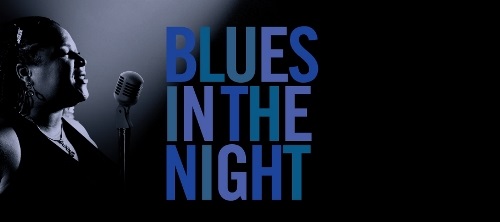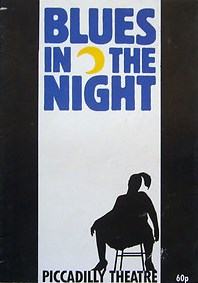Blues in the Night
Musical (1980)

The revue originally was staged by Epps and Gregory Hines under the supervision of Norman René at the off-Broadway Playhouse 46, where it ran for 51 performances between March 26 and May 11, 1980. The original cast consisted of David Brunetti, Rise Collins, Suzanne M. Henry, and Gwen Shepherd.
After thirteen previews, the Broadway production, directed by Epps, opened on June 2, 1982 at the Rialto Theatre, where it ran for 53 performances. Jean Du Shon, Debbie Shapiro, Leslie Uggams, and Charles Coleman comprised the cast. The show was nominated for the Tony Award for Best Musical.
The West End production, staged by Steve Whately, opened on June 9, 1987 at the Donmar Warehouse, where it ran through July 19, 1987. Maria Friedman, Debby Bishop, Carol Woods, and Clarke Peters comprised the cast. With Peter Straker replacing Peters, it transferred to the Piccadilly Theatre, opening on September 23 and running through July 28, 1988.
The show was nominated for the Laurence Olivier Award for Best New Musical and Woods received a nomination for Best Actress in a Musical. The London cast album was recorded live during the August 25–26 performances at the Donmar.
A production ran at the Minetta Lane Theatre, New York City, from September 14, 1988 through October 23, 1988 for 45 performances. The cast featured Carol Woods, Brenda Pressley, Kathleen Rowe McAllen and Lawrence Hamilton.
The revue was presented at the Post Street Theatre, San Francisco, for eight weeks in July through September 2007. Maurice Hines played the role of "The Man in the Saloon", with Carol Woods, Freda Payne and Paulette Ivory as the three women.
A tremendous West End success, this dynamic compilation of 26 hot and torchy blues frames and comments on three women's relationships with one snake of a guy. With no spoken text, the interweaving stories are defined through music alone - and what music! Ranging from Bessie Smith through Duke Ellington, Johnny Mercer/Harold Arlen, Alberta Hunter, Jimmy Cox, Ida Cox and more, the evening's music is raunchily forthright, infectiously good-humoured and always classically blues. Songs include "When A Woman Loves A Man", "Wasted Life Blues" and the title song.
Afficher le synopsis détaillé
ACT ONE
As the music begins, the lights come up on three women sitting in what look like individual hotel rooms in a worn down dive. The women are in period dress, reflecting Chicago in the late 1930's. The Lady from the Road, a warm and beautiful woman in her late 50's or early 60's, has surrounded herself with memories of her brighter past. The Woman of the World, a stylish creature of indeterminate age surrounded by an equal amount of perfume and liquor bottles, spends the evening preparing for her gentleman caller. The Girl With a Date sits in a sparsely decorated room determined to make a fresh start in the big city. Behind them, The Man in the Saloon, at once charming and dangerous, watches with a wary eye and comments with a silver tongue.
The Women sing from their individual areas as they set the stage for the evening. As much as they long for a man to hold them, they're alone. The Man, in the band area, sings about his hard luck as the women dream of a better time to come. The Man hangs out with the band as the Lady addresses the audience. She introduces the characters on stage, then changes into a flashy costume from her days as a singer. She sings "New Orleans Hop Scop Blues" as she shimmies and dances.
The Woman sits in her armchair and reminisces of days gone by. As she sings, her room is temporarily transformed into a dance hall. She sprays herself with perfume as the lights crossfade to the Girl. The Girl turns on her radio and recognizes the tune.
Addressing the audience, The Lady remembers what good old loving used to feel like. The Woman and the Girl add their voices from their rooms, taking turns and backing her up.
The Lady goes behind her screen to change and the Girl exits, leaving the Woman alone on stage. She puts on a dressing gown with great style. The man appears in another pary of the stage, singing, then exits. At the end of the song, the Woman exits, leaving the stage bare.
The Man enters alone and dreams of a better life - the life he wishes he had. The Lady enters in a brightly colored riding outfit, complete with parasol. The Man sings "Wild Women Don't Have No Blues," singing to each of the women, instructing them. The Women respond with "Lover Man," then join him in "Wild Women Don't Have No Blues."
The Girl, feeling lonely, sings "Willow Weep for Me." The Man shakes his head and exits as The Lady re-enters in a large feathered hat and too much costume jewelry singing a raunchy song about the kind of man she needs.
The Girl and The Woman enter from opposite sides and wing "When Your Lover Has Gone." The Lady joins them and they sing "Take It Right Back," proclaiming that they are done with low-down dirty dog men.
ACT TWO
The lights come up on each person as they begin to sing. They are alone in their individual areas. The singers have become more and more undone, drinking steadily and slowly over the course of the evening. The shine is beginning to wear off as they reveal their true situations. The Lady addresses the audience explaining that it's "Blues Time" - around three in the morning. The Girl's date never showed up, The Woman never had anyone to begin with, and the Lady is alone with her memories. The Lady says she needs to talk to the women in the audience and tells the men to either leave or cover their ears. The other Women back her up.
The Man and the Women trade off as they talk about their worn down hearts. The Man wishes for a woman to love him the way he is. The Women lament over how untrustworthy men can be. As the Man starts to leave, The Woman comes downstage and focuses on him singing that she wants a "Rough and Ready Man" - one who isn't afraid to work. The Man shivers and exits as The Woman gets more and more carried away.
The Girl, sitting at the table in her room is clearly a little drunk. She feels she's growing old and has to live while she can, teasing the men in the audience with the "Reckless Blues." The rest of the stage goes dark and The Lady is taking one last look at her scrapbook and sings the "Wasted Life Blues." She lies down on her bed as if she intends never to get up again. The Man enters and sings "Baby Doll," looking at The Lady. He turns to the audience and turns up the heat, then struts off cockily.
The Woman sits alone at her vanity, staring into the mirror. The Lady and The Girl add their voices to hers.
In the Finale, all four singers join in "I Gotta Right to Sing the Blues / Blue Blues." We are left with an emotional impression of what life was like in the late 1930's in Chicago - good music, hard lives, and dreams that stretch on long into the night.
"Am I Blue?" (Harry Akst, Grant Clarke)
"Baby Doll" (Bessie Smith)
"Blue Blue" (Bessie Smith)
"Blues in the Night" (Harold Arlen, Johnny Mercer)
"Copenhagen" (Charlie Davis)
"Dirty No-Gooder Blues" (Bessie Smith)
"Four Walls (and One Dirty Window) Blues" (Willard Robison)
"I Gotta Right To Sing the Blues" (Harold Arlen, Ted Koehler)
"It Makes My Love Come Down" (Bessie Smith)
"I've Got A Date With A Dream" (Mack Gordon, Harry Revel)
"Kitchen Man" (Andy Razaf, Alex Bellenda)
"Low" (Vernon Duke, Milton Drake, Ben Oakland)
"Lover Man" (Jimmy Davis, Roger Ramirez, Jimmy Sherman)
"New Orleans Hop-Scop Blues" (Geo. W. Thomas)
"Nobody Knows You When You're Down and Out" (Bessie Smith)
"Reckless Blues" (Bessie Smith)
"Rough and Ready Man" (Alberta Hunter)
"Take It Right Back" (H. Grey)
"Take Me For a Buggy Ride" (Leola Wilson, Wesley Wilson)
"These Foolish Things Remind Me Of You" (Harry Link, Jack Strachey, Holt Marvell)
"Wasted Life Blues" (Bessie Smith)
"When a Woman Loves a Man" (Bernard Hanighen, Gordon Jenkins, Johnny Mercer)
"Wild Women Don't Have the Blues" (Ida Cox)
"Willow Weep for Me" (Ann Ronell)
Aucun dossier informatif complémentaire concernant Blues in the Night
Aucun dossier informatif complémentaire concernant Blues in the Night

Version 1
Blues in the Night (1980-03-Playhouse 46-Off Broadway)
Type de série: OriginalThéâtre: Playhouse 46 (Broadway (Off) - Etats-Unis) Durée : 1 mois 2 semaines Nombre : 51 représentationsPremière Preview : Inconnu
Première: 26 March 1980
Dernière: 11 May 1980Mise en scène : Sheldon Epps • Chorégraphie : Sheldon Epps • Producteur : Star(s) : Avec: David Brunetti, Rise Collins, Suzanne M. Henry, Gwen Shepherd

Version 2
Blues in the Night (1987-06-Donmar Warehouse-London)
Type de série: Original LondonThéâtre: Donmar Warehouse (Londres - Angleterre) Durée : 1 mois 1 semaine Nombre : 51 représentationsPremière Preview : Inconnu
Première: 12 June 1987
Dernière: 19 July 1987Mise en scène : Sheldon Epps • Chorégraphie : Sheldon Epps • Producteur : Star(s) : Avec: Cast: Carol Woods, Debbie Bishop, Maria Friedman, Clarke PetersCommentaires : This was a heavily revised version which was much praised at the Donmar and transferred for a successful run to the Piccadilly.

Version 3
Blues in the Night (1987-09-Piccadilly Theatre-London)
Type de série: West End TransferThéâtre: Piccadilly Theatre (Londres - Angleterre) Durée : 9 mois 4 semaines Nombre : 346 représentationsPremière Preview : Inconnu
Première: 28 September 1987
Dernière: 23 July 1988Mise en scène : Sheldon Epps • Chorégraphie : Sheldon Epps • Producteur : Star(s) : Avec: Cast: Carol Woods, Debbie Bishop, Maria Friedman, Peter StrakerCommentaires : This was a heavily revised version which was much praised at the Donmar and transferred for a successful run to the Piccadilly.
Pas encore de video disponible pour ce spectacle